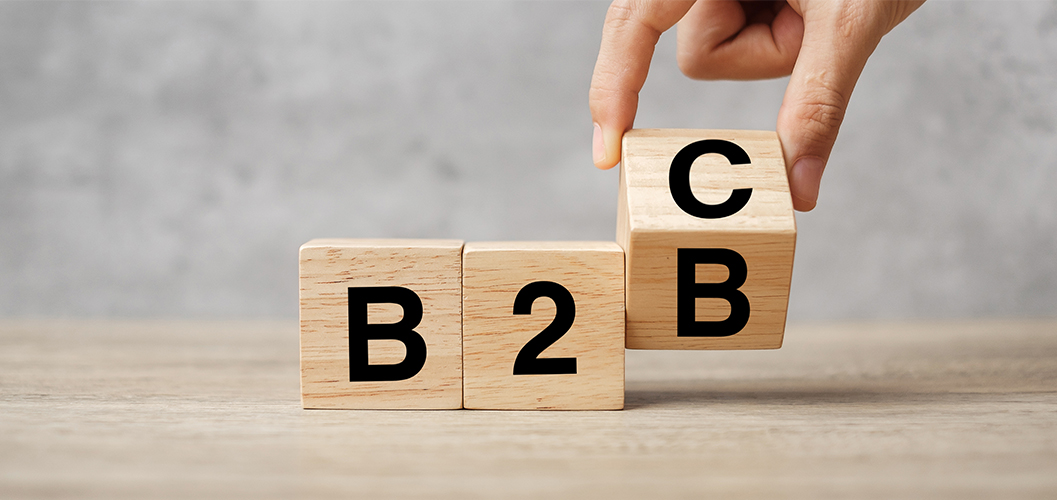We use cookies to make your experience better. By continuing to use our site, you agree to our use of cookies. Click here to find out more.
B2B & B2C – Everything You Need To Know

In the UK, many businesses fall into two distinctly different organisation types; Business-to-Business (B2B) & Business-to-Consumer (B2C).
B2B businesses typically sell goods and services to other businesses, where as B2C businesses, such as retailers and online sellers, sell directly to the consumers of the public.
For example, as a leading UK online wholesaler, Pound Wholesale fall into the B2B category of businesses. However, with tens of thousands of registered businesses in the UK, Europe and beyond, our customers include a huge range of enterprises, including B2B and B2C organisations.
With a vast array of regulations to comply with, both B2B and B2C businesses need to ensure they’re fully compliant to look after themselves from a legal and reputation point of view. This illustrates the importance of retailers and businesses establishing from the get-go which category they fall into.
For more information about starting your business with Pound Wholesale, please don’t hesitate to get in touch with us.
Business-to-Business vs Business-to-Consumer
Target Markets
Whereas a B2B business targets fellow businesses, B2C businesses target consumers directly. Both of which are targeting vastly different areas, and will need to utilise completely different methods to reach their customer base.
When it comes to marketing and advertising in an increasingly digital age, it’s very important to understand your customer base.
For B2C customers, it’s essential to optimise your brand and product visibility. B2C businesses’ target audience can be any member of the general public. Male or female, young or old, their location, interest or requirement. B2C businesses need to capture their customer’s attention, whether that’s in a fraction of a second on a social media feed, search engine listing, advertisement or public space.
A consumer’s decision to buy a product or service with a B2C business may be driven by price, quality, convenience, brand reputation and an array of others.
For B2B businesses, it’s crucial to understand the needs of fellow businesses, and how to reach them.
Typically, many B2B partnerships are referrals or relationships that have been established over long-periods, developing a level of understanding between two enterprises. To target various industries and discover new clients, a B2B business can use channels such as directories or LinkedIn, or attend expos and industry events.
For a B2B business to get a fellow business on-board, they will often present itself as the ‘smart’ choice, providing reliable, viable and profitable services to give organisations peace of mind.
Pricing
When it comes to pricing, B2B prices are usually lower than B2C prices when it comes down to units. This is because businesses or more price sensitive than consumers, and often purchase in bulk, which provides opportunity to negotiate with suppliers.
Whilst buying from suppliers or wholesalers, such as Pound Wholesale, businesses and traders are likely to make great savings, which offers some leeway or compromise when it comes to trading with businesses, whilst offering superior value for regular consumers in-store or online.
Key Business-to-Business UK Trading Regulations & Standards
The Consumer Protection from Unfair Trading Regulations
These regulations prevent organisations from engaging in unfair trading practices, including malicious or misleading advertising and false claims.
Controlling unfair practices utilised by traders, the Consumer Protection from Unfair Trading Regulations can create a criminal offence for traders which are misleading about their products or services.
The Competition Act 2002
The Competition Act 2002 prevents businesses from engaging in anti-competitive practices, such as price-fixing, collusion and other malicious activities. Promoting the efficiency, adaptability and development of the UK economy, The Competition Act 2002 provide consumers with competitive prices and sufficient product choices.
The Data Protection Act 2018
The Data Protection Act 2018 required businesses to protect the personal data of their clients. The UK’s implementation of the General Data Protection Regulation (GDPR), legislation of the European Union, the Data Protection Act 2028 ensures businesses are responsible for their customer’s and businesses data. The strict rules, entitled ‘data protection principles’, ensure personal data and information is utilised fairly, lawfully and transparently.
The Sale of Goods Act 1979
The Sale of Goods Act 1979 stipulates the legal right of buyers and sellers in relation to the sale of goods. Firstly, the contract of sale of goods is a contract by which the seller transfers or agrees to transfer the property in goods to the buyer for money consideration, entitled price. There can be a contract of sale between one part owner and another, and a contract of sale may be absolute and conditional.
It’s crucial that B2B businesses are protected by their terms and conditions before entering a corporate business contract, and that any potential client is aware of these terms.
Key Business-to-Consumer UK Trading Regulations & Standards
The Consumer Rights Act 2015
This regulation stipulates the right of consumers when they purchases goods from B2C businesses. Covering everything from the quality of goods, right to repair or replace goods and the right to cancel a contract, The Consumer Rights Act 2015 is legislation which protects consumers against hidden charges once they have entered a contract.
The Consumer Protection from Unfair Trading Regulations 2008
The Consumer Protection from Unfair Trading Regulations 2008 prevent B2C businesses from conducting unfair commercial practises, such as misleading advertising, false claims to aggressive sales techniques.
The Privacy and Electronic Communications (EC Directive) Regulations 2003
The Privacy and Electronic Communications Regulations, also known as PECR, helps to control the use of electronic marketing, like email or text messages, whilst requiring businesses to obtain clear consent before distributing marketing material to consumers.
The Distance Selling Regulations 2000
The UK Distance Selling Regulations apply to all business that sell items or services to consumers online, by phone or mail order. This includes Pound Wholesale customers that may distribute their products via marketplaces, social media or their own websites.
Stipulating the rights of consumers to cancel contracts, the UK Distance Selling Regulations apply provide the information that businesses must provide to customers prior to making a purchase.
Before a consumer can place an order with you, it is the B2C Business’ responsibility to provide the following;
- The business name, contact details and address
- A description of all goods and services
- Price inclusive of VAT
- How customers pay for their order
- Delivery arrangements, cost and timescales
- The minimum length of their contract and billing period
- Conditions for ending contracts
- How to cancel and when the right of cancellation is lost
- If there are reasonable costs to pay after cancellation
- A cancellation form, if there is a cancellation
- Conditions for funds provided as a deposit or financial guarantees
- The role of digital content
- Phone line & communications costs if greater than the basic rate

